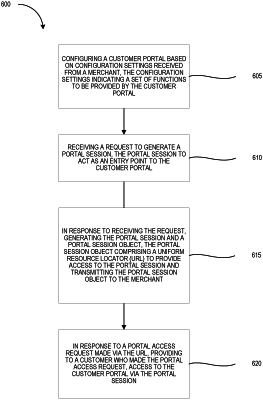| CPC G06Q 30/016 (2013.01) [G06F 9/547 (2013.01); G06F 16/955 (2019.01); G06Q 30/0641 (2013.01); H04L 67/146 (2013.01)] | 14 Claims |

|
1. A method for a commerce platform to provide access to a customer portal hosted by the commerce platform on behalf of a merchant system comprising:
configuring the customer portal based on configuration settings received from the merchant system, the configuration settings indicating, using a portal session, a set of functions to be provided by the customer portal, wherein a schema of the portal session comprises a customer identifier (ID) of the customer, a secret string, a return URL, and a reference to the configuration settings, the customer ID and the return URL are extracted from the request to generate the portal session, and the URL comprises a copy of the secret string to differentiate the URL from a plurality of URLs corresponding to a plurality of other portal sessions;
receiving, by the commerce platform, a request to generate the portal session, the portal session to act as a single application programing interface (API) endpoint for the set of functions to the customer portal;
in response to receiving the request, generating, by the commerce platform, the portal session and a portal session object, the portal session object comprising a uniform resource locator (URL) to provide access to the portal session;
transmitting the portal session object to the merchant system;
in response to a portal access request made to the single API endpoint via the URL, providing by the commerce platform, to a customer who made the portal access request, access to the customer portal via the portal session;
receiving, at the single API endpoint, an API call that requests the commerce platform to perform a function from the set of functions;
translating, by the single API endpoint, the received API call to one or more backend API endpoints of the commerce platform; and
transmitting, by the single API endpoint to the one or more backend API endpoints, the received API call, causing the one or more backend API endpoints to perform the function.
|